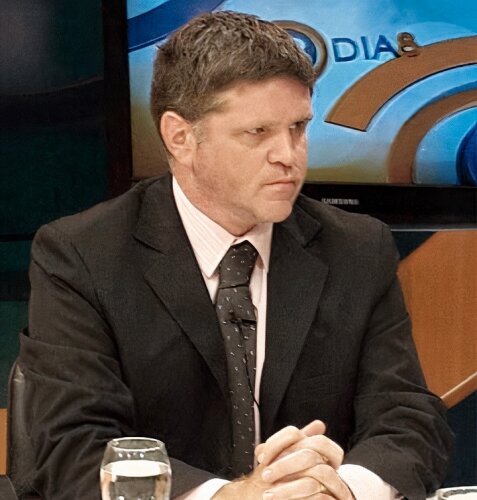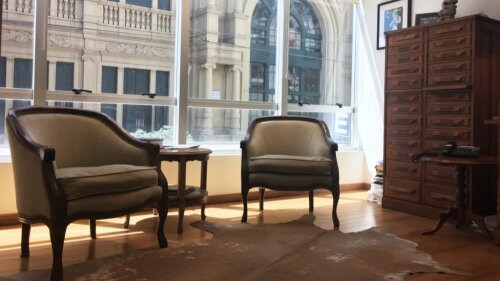Best Communications & Media Law Lawyers in Córdoba
Share your needs with us, get contacted by law firms.
Free. Takes 2 min.
List of the best lawyers in Córdoba, Argentina
About Communications & Media Law Law in Córdoba, Argentina
Communications and media law in Córdoba sits at the intersection of national regulation, provincial administration, constitutional rights, and sector-specific rules. Key topics include freedom of expression, audio-visual services and broadcasting, telecommunications and internet services, data protection and privacy, advertising and consumer rules, and intellectual property protections for content. National laws establish core frameworks that apply across Argentina, while provincial agencies and municipal authorities in Córdoba manage certain local licensing, permits and administrative interactions. In practice this means content producers, broadcasters, digital platforms, journalists, and telecom providers must navigate both national regulators and local procedures when operating in Córdoba.
Why You May Need a Lawyer
Communications and media matters often combine technical regulation with constitutional rights and commercial concerns. You may need a lawyer if you face allegations of defamation or privacy invasion, are seeking to enforce or defend intellectual property rights, need help obtaining or renewing radio or television permits, face fines or sanctions from regulators, are subject to a takedown notice or notice-and-notice procedures, need to respond to a consumer or subscriber dispute, or require representation in administrative proceedings before a regulator. Lawyers also help with contract drafting for content production and distribution, ensuring compliance with advertising rules, and designing privacy and data protection policies that meet Argentine requirements.
Local Laws Overview
Several legal instruments are especially relevant in Córdoba. At the national level, Ley 26.522 - Ley de Servicios de Comunicación Audiovisual - sets principles for broadcasting content, diversity, and access to media. The Ente Nacional de Comunicaciones - ENACOM - is the main regulator for telecommunications, radio, television and certain internet-related matters after organizational reforms. Data protection is governed by Law 25.326 on Personal Data Protection, which regulates the collection, processing and transfer of personal data; it is complemented by national administrative guidance and enforcement bodies. Copyright and related rights are protected under Argentina's copyright regime - Ley 11.723 - which covers authors, performers and producers and establishes remedies for infringement.
Consumer protection rules and advertising standards also affect media and communications - misleading advertising or unfair contract terms with subscribers may give rise to claims before consumer protection offices. Freedom of expression and press protections are rooted in the Argentine Constitution and interpreted by courts - these rights are important in disputes about content regulation, prior restraints, or sanctions against journalists and media outlets. Provincial and municipal rules in Córdoba can regulate local permits for radio or community stations, municipal sign and permit rules, and provincial access to public information. When operating in Córdoba, providers must follow national licensing requirements while complying with provincial administrative procedures and municipal bylaws where applicable.
Frequently Asked Questions
What regulator oversees broadcasting and telecommunications for operators in Córdoba?
The principal national regulator is the Ente Nacional de Comunicaciones - ENACOM - which oversees telecommunications, radio and television matters at the national level. Local authorities in Córdoba may be involved for provincial permits, municipal permits or community broadcasting authorizations. For consumer complaints related to telecom or broadcasting services, ENACOM and consumer protection agencies may be the first administrative bodies to contact.
Do I need a license to operate a radio or television station in Córdoba?
Yes. Operating a radio or television broadcast service normally requires authorization or licensing under national audiovisual and communications rules, and may require local permits. There are specific procedures and technical requirements for frequency use, station classification and public interest obligations. Community and non-commercial stations have distinct regimes with eligibility rules. A lawyer or communications consultant can help prepare applications and respond to technical and administrative requirements.
What protections exist for journalists and freedom of expression?
Freedom of expression and freedom of the press are protected under the Argentine Constitution and relevant jurisprudence. These protections limit government censorship and prior restraints, but they do not provide absolute immunity from civil claims such as defamation or from criminal offenses that remain applicable under Argentine law. Remedies and defenses depend on case facts, such as whether the content concerns public interest matters or whether it was published with due diligence.
How are defamation and privacy claims handled in Córdoba?
Defamation and privacy claims can be pursued in civil or criminal courts. Civil claims typically seek retraction, correction and damages. Criminal libel provisions exist but have been subject to reform and judicial scrutiny; criminal action may still be possible in certain circumstances. Media defendants commonly rely on defenses such as truth, public interest, and good-faith reporting. For privacy or image-right violations, remedies can include injunctions and damages. It is important to act quickly to preserve evidence and to seek legal advice before or immediately after publication if risk exists.
What rules apply to online platforms and streaming services?
Online platforms and streaming services must comply with national obligations that touch on consumer protection, advertising rules, intellectual property and data protection. While specific content moderation rules for global platforms are evolving, platforms operating in Argentina must respond to lawful removal orders and follow due process when dealing with user claims. Regulatory oversight may involve ENACOM for transmission elements and consumer authorities for subscriber relations. Contracts with content creators and distribution agreements should address rights, licensing territories and liability allocation.
How does data protection affect media and communications activities?
Law 25.326 governs personal data protection in Argentina. Media outlets and communications companies that collect or process personal data must respect principles such as purpose limitation, proportionality, and security. Sensitive data requires higher protections. Data subject rights include access, correction and, in certain cases, deletion. Data breach incidents require prompt action to contain harm and to comply with applicable notification obligations. Legal counsel can help design privacy notices, lawful bases for processing, and data security programs.
What intellectual property issues should content creators watch for?
Copyright and related rights protect original works, musical works, programs, broadcasts, and performances. Content creators should secure clear rights for music, audiovisual elements, images and text used in productions through licenses or assignments. Collective management organizations collect and manage rights for authors and performers, and producers must comply with their rules and tariffs when using protected works. Infringement claims may lead to injunctions and damages.
How can I challenge a regulatory fine or sanction in Córdoba?
If you receive a fine or administrative sanction from a regulator, you typically have administrative remedies such as internal appeals and requests for reconsideration. After exhausting administrative channels, you may bring judicial review actions - for example, an amparo or annulment action - depending on the circumstances. It is important to meet procedural deadlines and to preserve documentation while seeking legal representation experienced in administrative and communications law.
What should I do if my broadcast or online content is subject to a takedown notice?
Review the notice carefully to determine the legal basis and any required response time. Preserve the content and related metadata. If the notice appears unfounded, seek legal advice immediately to consider opposing the takedown, requesting counter-notification where permitted, or negotiating with the claimant. If the takedown implicates urgent freedoms such as news reporting or public interest content, court remedies to restore content can be pursued in some cases.
How do I find a qualified lawyer in Córdoba for communications and media matters?
Look for lawyers or law firms with experience in communications, media, telecommunications, intellectual property and administrative law. Ask about previous cases or regulatory work, experience with ENACOM and administrative procedures, and courtroom or appellate experience if litigation may be needed. Professional referrals from the Colegio de Abogados de Córdoba, law faculties, trade associations, journalists associations, or media businesses can help. Arrange an initial consultation to discuss fees, strategy and anticipated timelines.
Additional Resources
Ente Nacional de Comunicaciones - ENACOM - national regulator for telecom and broadcasting.
Law 26.522 - Ley de Servicios de Comunicación Audiovisual - national audiovisual framework.
Law 25.326 - Personal Data Protection Act - national data protection regime and guidance.
Ley 11.723 - Argentine copyright law - rules on authorship and related rights.
Agencia de Acceso a la Información Pública and Dirección Nacional de Protección de Datos Personales - bodies that handle access to public information and data protection guidance at the national level.
Instituto Nacional contra la Discriminación, la Xenofobia y el Racismo - INADI - addresses discrimination-related complaints in media content.
Colegio de Abogados de Córdoba - for lawyer referrals and professional standards in the province.
Provincial Secretaría or Dirección de Comunicación - check the Gobierno de la Provincia de Córdoba for local administrative procedures and permits.
Consumer protection offices - national and provincial consumer protection agencies handle subscriber and consumer disputes related to communications services.
Universidad Nacional de Córdoba - Facultad de Derecho and local media or journalism schools - sources of academic expertise and research on media law.
Next Steps
If you need legal assistance in communications and media law in Córdoba, first identify the main issue - for example, defamation, licensing, regulatory sanction, data breach or copyright dispute. Gather all relevant documents, such as notices, contracts, publications, technical records and correspondence. Contact a lawyer with communications or media experience to discuss urgency, possible interim remedies and costs. If the matter involves imminent publication, takedown or criminal exposure, request an expedited consultation. If the issue is regulatory or licensing related, verify deadlines for administrative responses and appeals. Keep clear records of all communications and follow your lawyer's advice about public statements to avoid worsening the legal situation.
Finally, consider preventive steps: review contracts, implement privacy and content policies, register or document your intellectual property rights, and ensure compliance with advertising and consumer rules. Proactive legal support reduces risk and often costs less than dealing with disputes after they arise.
Lawzana helps you find the best lawyers and law firms in Córdoba through a curated and pre-screened list of qualified legal professionals. Our platform offers rankings and detailed profiles of attorneys and law firms, allowing you to compare based on practice areas, including Communications & Media Law, experience, and client feedback.
Each profile includes a description of the firm's areas of practice, client reviews, team members and partners, year of establishment, spoken languages, office locations, contact information, social media presence, and any published articles or resources. Most firms on our platform speak English and are experienced in both local and international legal matters.
Get a quote from top-rated law firms in Córdoba, Argentina — quickly, securely, and without unnecessary hassle.
Disclaimer:
The information provided on this page is for general informational purposes only and does not constitute legal advice. While we strive to ensure the accuracy and relevance of the content, legal information may change over time, and interpretations of the law can vary. You should always consult with a qualified legal professional for advice specific to your situation.
We disclaim all liability for actions taken or not taken based on the content of this page. If you believe any information is incorrect or outdated, please contact us, and we will review and update it where appropriate.









